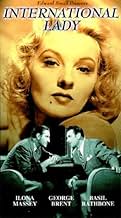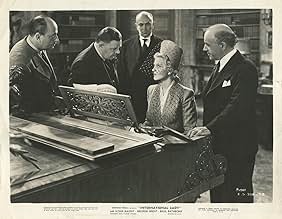The film opens with a German air raid over the skies of London, and moves to the attempts of the F.B.I. and Scotland Yard investigators trying to circumvent the attempts of a sabotage ring d... Read allThe film opens with a German air raid over the skies of London, and moves to the attempts of the F.B.I. and Scotland Yard investigators trying to circumvent the attempts of a sabotage ring dedicated to impeding the flow of American airplanes and flying fortresses to Britain (on F... Read allThe film opens with a German air raid over the skies of London, and moves to the attempts of the F.B.I. and Scotland Yard investigators trying to circumvent the attempts of a sabotage ring dedicated to impeding the flow of American airplanes and flying fortresses to Britain (on FDR's Lend-Lease program since the United States was not yet at war with Germany and Italy.... Read all
- Director
- Writers
- Stars
- Denby
- (as Gordon DeMain)
- Sir Henry
- (as Frederic Worlock)
- Taxi Driver
- (uncredited)
- Krell, the Chemist
- (uncredited)
- Agent
- (uncredited)
- Party Guest
- (uncredited)
- Undetermined Secondary Role
- (uncredited)
- Director
- Writers
- All cast & crew
- Production, box office & more at IMDbPro
Featured reviews
"International Lady" was released in the U. S. and the UK in mid-October of 1941. The U. S. would enter the war in less than two months, after the Japanese bomb Pearl Harbor. But U. S. involvement before that was extensive. It provided weapons and material for Great Britain and Russia. The U. S. supplies were crucial to the Allied war effort. They knew it, and Nazi Germany knew it. That's why German espionage worked feverishly to try to disrupt the American supply lines.
Within days after the U. S. entered the war, 33 members of the Duquesne spy ring were sentenced to death. It was organized in the late 1930s, and many of its members had civil service and government jobs. It was the largest Nazi spy ring broken up in the U. S.
This film doesn't directly name the Nazis or Germany as the enemy. The plot centers on British and American cooperation in routing a spy ring. But it also has some music, romance and comedy. The latter is in a friendly tete-a-tete between two Allied agents. Tim Hanley is an FBI agent and Reggis Oliver is from Scotland Yard. George Brent plays Hanley and Basil Rathbone plays Oliver.
Before WW II, U. S. intelligence work was done by the FBI and special offices of the Army and Navy. The British had its intelligence agencies - MI 6 and the Special Operations Executive (SOE). The American CIA didn't come into existence until after the war. It took over the Office of Strategic Services (OSS), which had been set up in June 1942. So, before the U. S. entered the war, Scotland Yard and the FBI likely would have been the respective agencies of the two countries to coordinte efforts to uncover German espionage.
Ilona Massey plays Carla Nillson, a famous Norwegian singer who also was a German agent. This seems odd because Norway and its people were mosty opposed to the Nazis who had invaded ther country. Instead, Massey might have been cast as a Hungarian or Austrian singer. She was born in Hungary, and began her singing career in those countries.
Massey never achieved stardom in Hollywood, but she was a very good actress. She also had a beautiful soprano singing voice. This film has just two short scenes of her singing. She sang and starred in two Hollywood musicals that she made with Nelson Eddy. She is probably best known for those musical films - "Balalaika" of 1939, and "Northwest Outpost" of 1947.
Other prominent actors of the day in this film are Gene Lockhart, George Zucco, Frederick Worlock, Charles Brown and Clayton Moore (who played the Lone Ranger).
Before WW II, spying was something more mythical than real to an American public. But, within a few years after the end of the war, the scandals of widespread Soviet Union espionage surfaced in the U. S., Canada, and Great Britain.
The light-hearted relationship between the Brent and Rathbone characters works well for this film. It's an interesting and entertaining spy thriller with doses of light comedy, romance and some pleasant music.
A favorite line in the film is when the FBI chief is talking to an Army colonel on the phone. He says, "But that's taking a big chance." The colonel replies, "What do you think armies do?" And, when Reggis Oliver visits the FBI office with Tim Hanley, the Brit is greeted by an overly exaggerated dose of American slang of the period. FBI trainee, Bud (unlisted), says, "Scotland Yard, gee. That sorta sends me wacky. Oh, the brain said PDQ. Better breeze in." Reggis Oliver, to Tim Hanley, "He talks in code, doesn't he?"
The film is a spy yarn involving an American FBI agent (George Brent) and a British equivalent (Basil Rathbone). Both are investigating a Norwegian opera singer, as she seems to have some connection with a German sabotage program...and they've been destroying airplanes and ships from the US bound for the UK.
This film would have played well in Britain, and SOME Americans also would have enjoyed it because more and more Americans were of the opinion that the country would soon be pulled into the war. I say SOME because in the US, until the Japanese bombed Pearl Harbor, quite a few Americans were pro-German. However, by 1941, Hollywood was no longer worried about alienating the pro-Germans or folks interested in neutrality...and more and more films were casting the Germans as the bad guys.
So is this film any good? Well, Brent and Rathbone was good...as you would expect. As for Ilona Massey who plays the Norwegian, she was not so wonderful...and I'll say no more about that. As far as the story goes, it's almost competently written and interesting...though having Rathbone in disguise as a waiter at the dinner party was pretty dumb. Folks at the party (both friends and foes) surely would recognize him in his flimsy getup. Also, the evil opera singer's actions through the course of the story simply make no sense at all...none. But again, the good outweighs the bad and overall it's a decent film.
There is no mystery in this film as it is clear from the beginning that Massey is a baddie. This does not matter, though, as the film is fast-moving and keeps you watching. In fact, there may be a few sequences too many. The cast are good and it seems like a pilot film for a series starring Brent and Rathbone as they solve a different mystery together each week. It would have been a good idea as they have a chemistry that works between them. Massey reminded me slightly of Marlene Dietrich and her low-pitched voice is slightly freaky. I'm surprised that she didn't sound a bit more freakish when she sang.
Unfortunately, the copy I watched was poorly taped off the TV and had serious sound interference throughout the whole film. Overall, the film entertains while it runs its course but there's nothing too special going on.
Did you know
- Trivia'George Brent' to refers to Basil Rathbone as "Sherlock" about half way through the movie. Rathbone had already made a couple of Sherlock Holmes movies and was scheduled to make several more.
- Quotes
Carla Nillson: [reacting to his advances] You Americans are just as bad as the Irish!
Tim Hanley: Well, a lot of us *are* Irish!
- Crazy creditsThe opening credits rise up from the bottom of the screen and from a distance, at about a 30-degree angle from the vertical.
- ConnectionsReferenced in Let's Go to the Movies (1949)
Details
- Release date
- Country of origin
- Languages
- Also known as
- International Lady
- Production company
- See more company credits at IMDbPro
- Runtime1 hour 42 minutes
- Color
- Aspect ratio
- 1.37 : 1
Contribute to this page





































